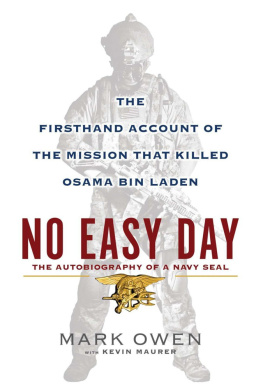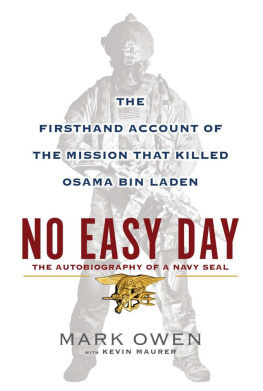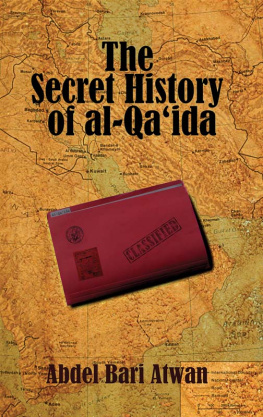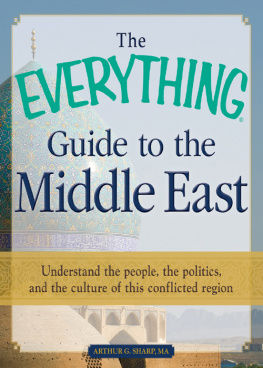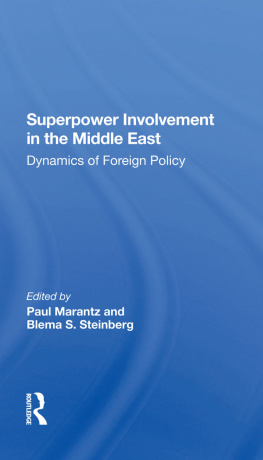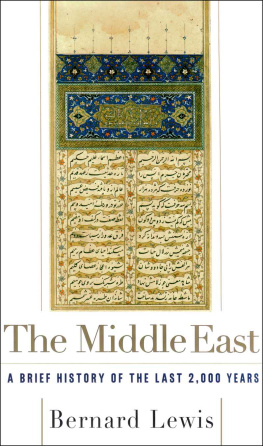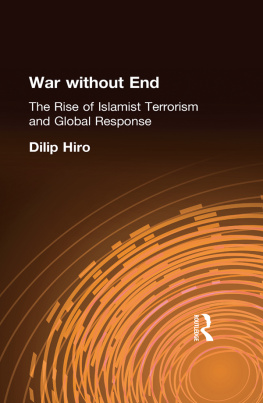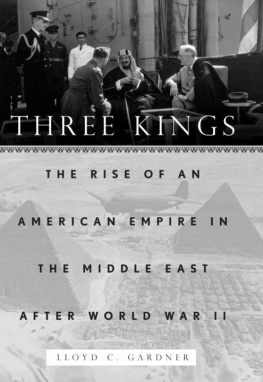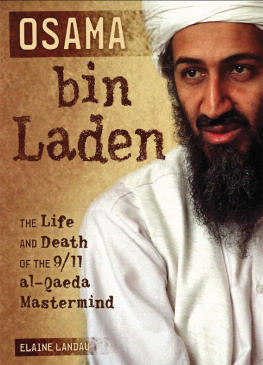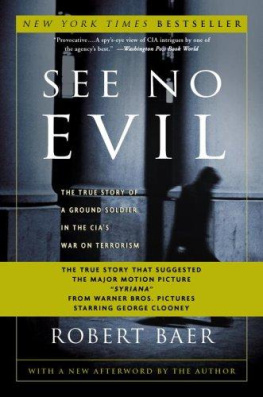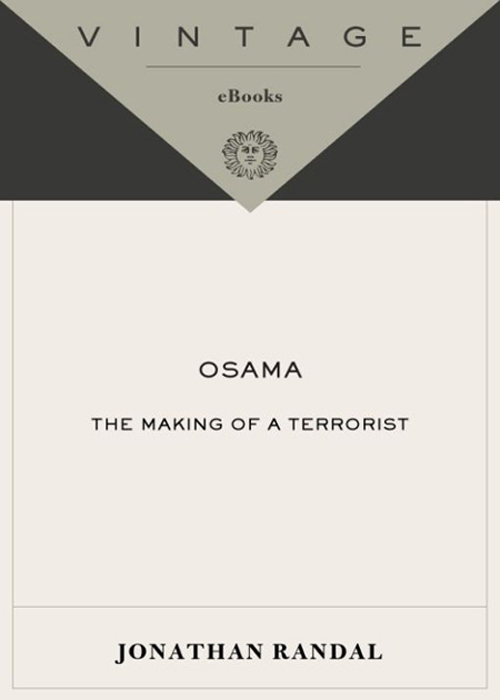
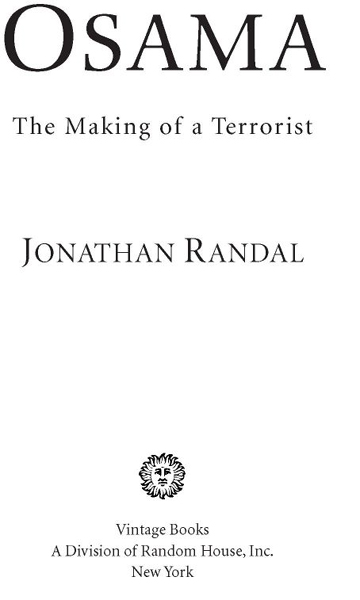
Table of Contents
To Genevive
Acclaim for Jonathan Randals OSAMA
Very worthwhile, illuminating without being alarmist.... The beauty of Randals narrative is how richly its rooted in his reporting experiences.
The Christian Science Monitor
[A] meticulous account of the emergence and spread of the terror virus [and a] map of the world that produced him and his fellow Islamists.
The New York Times Book Review
Fascinates.... The main value of the book is the political background it provides of the Islamic world. Here the author... is in his element; he has interviewed ambassadors, security chiefs and heads of state. He has watched their maneuvers and knows their motives.
The Seattle Times
A useful primer about what we knowand all we dont knowabout terrorism.
USA Today
The volume does a nimble and often highly compelling job of leading the reader through the labyrinth of information and speculation about Al Qaeda and the broader jihadi movement.
The New York Times
Wonderful.... Randal has combined worldliness, impressive knowledge and a compelling writing style to produce a morbidly fascinating work.
The Plain Dealer
Excellent.... Authoritative and most informative.... Randal has access to key figures and offers insights that a less experienced correspondent could not provide.... [An] insightful analysis of the administrations current Middle East policy.
St. Louis Post-Dispatch
Richly researched.... An interesting and useful book.
Newsday
Absorbing.... [Randal writes] with the urgency of firsthand experience, with the authority of a man whos spent decades seeing the United States through the eyes of the Third World.
San Antonio Express-News
Irresistible. By involving the reader in his own peregrinations, Randal has produced a first-person adventure that blends analysis and reportage.
The News & Observer (Raleigh)
[An] insightful look at the worlds most famous terrorist.
Milwaukee Journal Sentinel
Compelling.... Arresting observations.... The author draws on his vast experience to produce a balanced and revealing portrait of the man and the radical Islamic movement.... A timely and important work of firstrate reporting that provides invaluable insight.
Flint Journal
Thorough and lucid.... [Randal] takes the public Osama and demonstrates the ways, sometimes openly, sometimes shadowy, that he moved through [the Arab and Muslim] world before Sept. 11.... A valuable addition to [Randals] much-admired body of work.
Rocky Mountain News
Interesting.... Worthwhile.... Randal is at his best when intuiting the nuances of terrorism and the particular Middle Eastern culture [from] whence it springs.... American policymakers would do well to... glean perceptions from [him].
The Star-Ledger (Newark)
Both fascinating and frightening.... Seriously deepens the readers understanding of bin Laden.
The Santa Fe New Mexican
Fascinating.... [Randal] provides insight into the leaders personal life and personality.... [His] intimate understanding of the politics of the region make this one of the better biographies of this most elusive man.
Tucson Citizen
Prepare to be chilled: Its hard to see how one could not be disquieted by Jonathan Randals Osama.... [He] refuses to sugarcoat anything.
The Kansas City Star
Insightful, spare, and quite readable.... In this well-researched and thoughtful book, Randal offers us much to reflect upon this man whose idea, movement, and legacy will be with us for a long time to come.
Decatur Daily
Acknowledgments
I have taxed the limits of old and new friends who have helped me over the past five years. They include many journalists, academics, diplomats and businessmen, as well as other sources accumulated over five decades as a foreign correspondent in and out of the Muslim world. I owe them all my thanks. But I owe special thanks to two friendsWade Greene and Don Larrimore. They know why.
Authors Note
The National Commission on Terrorist Attacks Upon the United States issued its final report on the events surrounding 911 in July 2004, too late for inclusion in the original edition of this book. Based on unparalleled access to secret intelligence, captured Al-Qaeda operatives interrogations, and other previously closely guarded official documents, its key insights are included in this edition. They complete the authors own reporting, introduce new information and expand on known weaknesses in U.S. efforts to combat Al-Qaeda.
PREFACE
Writing about terrorism naturally means dealingor trying to dealwith terrorists and those who combat them, and at firsthand if possible. Frankly, I cannot claim to have been particularly successful in winning the confidence of major actors on either side of that great divide. Suspicion is one of several characteristics they share, especially when it comes to being asked about their respective peculiarand by definition secretspecialties. The fact is I totally failed to meet Osama bin Laden, but not for want of trying.
For two years I boxed the compass with letters and messages dispatched from a half dozen countries explaining my bona fides. I traveled extensively in the Muslim world and elsewhere to persuade interlocutors variously in touch with Osama that I wanted to meet him and, more especially, listen to his arguments at length. With all due respect to my television colleagues, theirs is a blunt instrument and one that rarely got beyond the slogans and injunctions that Osama masterfully manipulated in largely limiting his media exposure. His infrequent in-and-out news conferences and newspaper or magazine interviews were pretty much cut from the same limited cloth.
I wanted to spend time with Osama, a lot of time, indeed as much time as he would grant me. For some reason, I convinced myself he would welcome more than a quickie interview. So did various people who questioned me at length and gave me to understand that I had passed the test and they would help me. I argued that many decades as a foreign correspondent devoted to trying to understand the Third World, and more especially Muslim societies, qualified me for such extended treatment. In retrospect, I think I was fooling myself, since Osama was the master of the television interview and had no reason to welcome the in-depth sances I was proposing.
At one point, a helpful Pakistani colleague in Islamabad agreed to pass on a photocopy of a letter in Englishand its Arabic translationthat I had sent many months earlier through a friend in Central Asia with roundabout access to Osama in Afghanistan. In that letter, I once again mentioned my many earlier efforts to reach him, restated my purpose and asked if he had received my previous entreaties and copies of my books, which I had supplied various other interlocutors who had promised to deliver them. One, Going All the Way: Christian Warlords, Israeli Adventurersand the War in Lebanon, chronicled the Lebanese Christians political suicide back in the 70s and 80s. The other, After Such Knowledge, What Forgiveness? My Encounters with Kurdistan, dealt with repeated betrayals of the Kurds, often at Western and, more specifically, American hands. I had hoped they would establish my credentials as a Middle East hand not uncritical of the Wests checkered record in the region.
Next page

